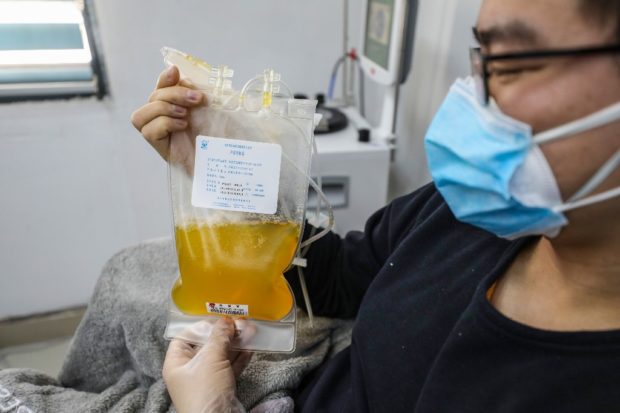India begins blood therapy trials on COVID-19 patients

This photo taken on February 18, 2020 shows a doctor who has recovered from the COVID-19 coronavirus infection holding a bag of plasma donated by him in Wuhan in China’s central Hubei province. Photo by STR / AFP
NEW DELHI — It has often been described as “liquid gold” because of its yellowish color and immunity-boosting properties.
Plasma extracted from human blood has proved beneficial in the treatment of many infections over the past two decades, including severe acute respiratory syndrome (Sars), Middle East Respiratory Syndrome (Mers) as well as H1N1 influenza or swine flu .
There is now growing interest in the application of convalescent plasma therapy (CPT) to help treat Covid-19 patients. Encouraged by studies in the United States and China that show CPT may help individuals fight the coronavirus, which causes Covid-19, India has also initiated trials to establish if the therapy can indeed help patients recover from the disease.
On April 12, the Indian Council of Medical Research (ICMR), the country’s apex body to regulate biomedical research, called for applications to study the safety and efficacy of CPT in managing complications associated with Covid-19. It has since received 99 applications from interested institutions and also begun giving permission for these trials to go ahead at different locations.
In the case of Covid-19, CPT involves drawing blood from a person who has fully recovered from the disease. Convalescent plasma, which contains antibodies that helped the individual fight the coronavirus, is then separated from the blood using a centrifuge and administered to a Covid-19 patient to help boost his or her immunity against the disease.
Article continues after this advertisementThe Maulana Azad Medical College (MAMC) in Delhi is one of the participating institutions in these trials. It is currently treating around 400 Covid-19 patients at the Lok Nayak Jai Prakash Narayan Hospital, which is associated with the college. Four of them received CPT this week.
Article continues after this advertisement“The results have been encouraging so far and the patients are reporting better oxygen saturation levels,” said Professor Suresh Kumar, the head of the Covid-19 task force at MAMC and director of its department of medicine.
“These antibodies can be really helpful if given to the right patient at the right time. It helps them rebuild their immunity and fight the Covid-19 infection,” he added.
But he cautioned that CPT should not be seen as a magic bullet that may help treat all Covid-19 patients.
Professor Kumar told The Straits Times that individuals most likely to respond well to CPT are those suffering from severe respiratory illness because of Covid-19 but without any comorbidity such as heart or liver diseases.
Delhi chief minister Arvind Kejriwal also held a press conference on Friday (April 24) to talk about the results from the trial at MAMC and said they have been encouraging until now. “These are only initial results; we must not think we have found a cure for coronavirus. This has just given us a ray of hope,” he added.
A number of prominent people in India, including those in Bollywood, have appealed to potential donors to donate plasma. The country had 23,077 coronavirus cases as of Friday afternoon and had recorded 718 deaths. More than 4,700 have recovered from the disease.
Indian institutions carrying out CPT trials hope to add to the global scientific community’s understanding of how it may help treat Covid-19. “The evidence that has come forth so far (of it working) has come from a small series of patients who were on ventilators and had severe respiratory problems. To extrapolate that it might work as a therapy for others is predicting too much at this stage. We need to know a lot more,” said Dr Asha Kishore, the director of the Sree Chitra Tirunal Institute for Medical Sciences and Technology in Trivandrum in the southern Indian state of Kerala.
The institute is one of the many that have applied to the ICMR for permission to carry out a clinical trial using CPT. Dr Kishore also told The Straits Times that any successful implementation of CPT will require donors to donate blood adequately. “This cannot be made mandatory and will, therefore, require social workers to counsel potential donors,” she said.
Those willing to donate will also have to be transported to blood banks amid the ongoing lockdown and their samples tested for Covid-19 as well as other infections to ensure no harm is caused to recipients. The plasma extracted has to be then sent to a hospital through a secure cold chain that maintains the temperature at minus 30 deg C. “These are some of the small challenges but they can be overcome,” she added.
For more news about the novel coronavirus click here.
What you need to know about Coronavirus.
For more information on COVID-19, call the DOH Hotline: (02) 86517800 local 1149/1150.
The Inquirer Foundation supports our healthcare frontliners and is still accepting cash donations to be deposited at Banco de Oro (BDO) current account #007960018860 or donate through PayMaya using this link.